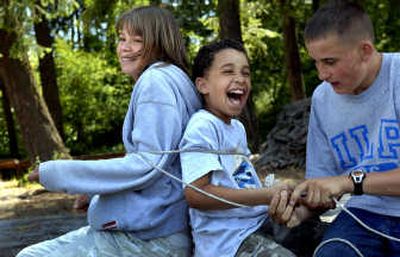Siblings separated by system reunite

HARRISON, IDAHO – For nearly a decade, the brothers struggled through separate lives.
One became a cowboy, dexterous with a lariat, with dreams of becoming a professional bull rider. The other favored AC/DC and the Ramones, and he dressed in black skater shoes and low-slung jeans.
So the reunion – on the shores of Lake Coeur d’Alene at a camp for foster children – was awkward for two teenagers trying to hold their emotions in check.
“He came up and almost tackled me to the ground, and gave me a big hug,” said Logan, an 18-year-old foster youth from Oregon, of last year’s reunion.
“It was just instinct,” said Lucas, 17.
Of the 600,000 children being raised in the nation’s foster care system, about 75 percent have been separated from at least one sibling, according to Camp To Belong, a national nonprofit that reunites siblings for one week.
For many, the trauma of being removed from their parents’ home is compounded by the separation from their siblings – a move often necessitated by the dearth of foster homes, according to state officials.
“Kids develop certain roles within their family,” said Karyn Schimmels, program director for the Northwest camp. “They often come to depend on each other to get through those really tough times. Oftentimes, that is their primary attachment – with a sibling rather than a parent.”
The nonprofit was founded by Lynn Price, a former foster child who did not learn she had a sister until she was 8 years old. The organization has received national awards, including recognition from talk show host Oprah Winfrey and a mention in the movie “Ocean’s Thirteen.”
The weeklong Northwest camp, which is staffed entirely by volunteers, received about $22,000 in state and federal money this year. An additional $78,000 was raised to pay for the expenses of 95 campers during their stay at Camp N-Sid-Sen, near Carlin Bay.
Schimmels, who wrote Oregon’s policy on keeping siblings together in foster care, said child-welfare leaders have begun to realize the importance of maintaining family connections.
“Kids are really traumatized when they are moved from their family of origin,” Schimmels said. “They should at least have each other to lean on. They share a common knowledge about what happened to them.”
The sibling reunions can be teary and, at times, rocky, as children reconnect and often relive the traumatic memories of their early childhood.
“One moment, they’re regular kids, and then they’ll just come and surprise you,” said Jessica Busch, a 26-year-old counselor from Chicago. “Everyone has to learn what works with each of the kids.”
For one family of five children, the camp led to a more permanent reunion. After last year’s camp, social workers moved four of the Oregon children into a single placement. The fifth lives in the same neighborhood.
“They decided that they wanted us to be together,” said Jennifer, 18. “We’re learning what each of us likes.”
For 11-year-old Tia and her ebullient 9-year-old brother, Shamarye, the camp provides a chance to see each other once a year. Shamarye lives in a foster home in Washington; Tia lives in Oregon.
“She calls me, but most of the time I’m out,” Shamarye said, tugging on his older sister’s arm. “Then when I try to call her back, she’s out.”
Leaning against a fence above the lake, Tia showed off a necklace that Shamarye gave her. She said she remembered her little brother, but the years of separation had begun to wear at her memory.
“I remember everyone called him ‘Bubba’ because his name was so hard to pronounce,” Tia said.
For Lucas and Logan, now on the verge of leaving foster care, the memories are even more distant. Logan remembered pushing his little brother around on a broken lawnmower. Lucas recalled a chaotic and abusive time.
“It left a big gap in both our lives,” Logan said. “We really don’t know how to show affection to each other. When my brother’s feeling really down, I can’t comfort him. I don’t know how.”
They said they are learning. Logan plays the electric guitar; Lucas plays the mouth harp. Logan likes punk and rock. Lucas favors country. They plan to stay in touch – now that Logan is finished with high school.
Last year, Logan agreed to a compromise. When he drove his 1988 Audi down to visit, he let his brother play a few country CDs in his car, which brought a smile from Lucas.
“He and my girlfriend are the only ones I have left,” Lucas said.